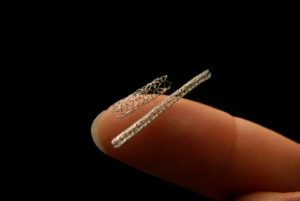
Ultra-thin strut drug-eluting stents (DES) may promote better clinical outcomes than thicker strut second-generation DES in percutaneous coronary intervention (PCI), according to recent research. Researchers used randomized clinical trials from EMBASE, PUBMED, and CENTRAL that compared newer generation ultra-thin strut DES (strut thickness <70 microns) and thicker strut second-generation DES use in PCI treatment to investigate efficacy of both.
10 trials were selected, containing 11,658 patients and 3 different new generation ultra-thin strut DES’s. The primary outcome measured was target lesion failure (TLF) at 1-year follow-up, defined by cardiovascular death, ischemia-driven target lesion revascularization (TLR), or myocardial infarction (MI). Stent thrombosis was evaluated as well.

Heart Stents Image credit: Ziptrials
Compared to the thicker strut second-generation DES, the ultra-thin strut DES expressed a 16% decrease in overall TLF (RR=0.84; 95% CI 0.72-0.99), largely due to reduction in MI occurrence. Lower rates of stent thrombosis were observed with the ultra-thin strut DES as well (RR=0.72; 95% CI 0.51-1.01). Researchers concluded that the newer generation ultra-thin strut DES is likely to improve 1-year clinical outcomes in patients undergoing PCI.
Source: Circulation







 © 2025 Mashup Media, LLC, a Formedics Property. All Rights Reserved.
© 2025 Mashup Media, LLC, a Formedics Property. All Rights Reserved.